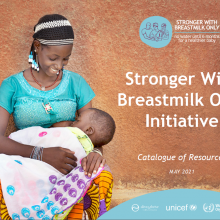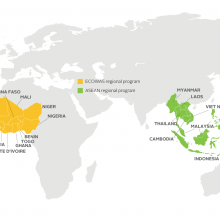Toolkit
May 16 2021

Stronger With Breastmilk Only Resources Catalog
This collection of resources and tools, developed by Alive & Thrive, UNICEF and WHO, supports national governments and their partners in adapting the "Stronger With Breastmilk Only" initiative to their national contexts.
Journal article
Apr 26 2021

Misalignment of global COVID-19 breastfeeding and newborn care guidelines with World Health Organization recommendations (Hoang, D.V., 2020. BMJ Nutrition, Prevention & Health)
Guidance documents from 33 countries on newborn care for infants whose mothers are diagnosed with confirmed or suspected COVID-19 were assessed for alignment with WHO recommendations, revealing considerable inconsistencies.
Journal article
Apr 22 2021

Old Tricks, New Opportunities: How Companies Violate the International Code of Marketing of Breast-Milk Substitutes and Undermine Maternal and Child Health during the COVID-19 Pandemic (Ching, C., 2021. Int'l Journal of Environmental Research and Pub Hth)
An analysis reveals that breastmilk substitutes companies are using health claims, misinformation about breastfeeding, digital marketing, and promotional tactics such as donations and services to capitalize on families’ COVID-19 fears to undermine breastfeeding and sell products.
Brief
Aug 20 2020

Southeast Asia and West Africa regional Cost of Not Breastfeeding briefs
Journal article
Feb 25 2020

The cost of not breastfeeding: global results from a new tool (Walters, D., 2019. Health Policy and Planning)
A billion dollars and two thousand lives, every day. This impactful study, which is the foundation for Alive and Thrive’s online tool, examines the human and economic costs of not breastfeeding.
Journal article
Feb 21 2020

Social, economic, and political events affect gender equity in China, Nepal, and Nicaragua: a matched, interrupted time-series study (Nguyen, T., 2020. Global Health Action)
This study suggested that supportive social and political environments can play an important role in empowering women, which in turn advances human rights and promotes health and well-being of individuals, households, communities, and countries.

